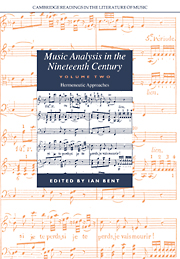Book contents
- Front matter
- Contents
- Preface to volumes I and II
- List of abbreviations
- General introduction
- Part I: Elucidatory analysis
- Part II: Objective–subjective analysis: the hermeneutic circle
- Introduction
- Analysis 8 Jérôme-Joseph de Momigny (1762–1842)
- Analysis 9 Ernst Theodor Amadeus Hoffmann (1776–1822)
- Analysis 10 Robert Schumann (1810–1856)
- Analysis 11 Abramo Basevi (1818–1885)
- Analysis 12 Adolf Bernhard Marx (1795?–1866)
- Analysis 13 Theodor Helm (1843–1920)
- Afterword to volumes I and II
- Bibliographical essay
- Index to Volumes I and II
Analysis 8 - Jérôme-Joseph de Momigny (1762–1842)
Cours complet d'harmonie et de composition (1805)
Published online by Cambridge University Press: 10 December 2009
- Front matter
- Contents
- Preface to volumes I and II
- List of abbreviations
- General introduction
- Part I: Elucidatory analysis
- Part II: Objective–subjective analysis: the hermeneutic circle
- Introduction
- Analysis 8 Jérôme-Joseph de Momigny (1762–1842)
- Analysis 9 Ernst Theodor Amadeus Hoffmann (1776–1822)
- Analysis 10 Robert Schumann (1810–1856)
- Analysis 11 Abramo Basevi (1818–1885)
- Analysis 12 Adolf Bernhard Marx (1795?–1866)
- Analysis 13 Theodor Helm (1843–1920)
- Afterword to volumes I and II
- Bibliographical essay
- Index to Volumes I and II
Summary
The theorist who ‘abandons his readers to their own analyses of good models without demonstrating [how to conduct] such analysis’ neglects his duty. As we saw in vol. I of the present work (see the General Introduction, §§1–2, and the Introduction to Part I), Momigny's Complete Course in Harmony and Composition of 1803–05 resorts frequently to analysis of ‘musical masterpieces’. The analytical content of the central chapters is astonishingly high. Thus, of the twenty pages comprising the chapter on counterpoint, eighteen contain microscopic analyses of seven two-part passages by Handel, C. P. E. Bach and Haydn; of the seven pages on canon, six give operation-by-operation analyses of canons by Clementi and Haydn; of the twenty-seven pages comprising Momigny's chapter on fugue (see vol. I, Analysis I), twenty-five are devoted to analysing two whole examples, one by Bach, one by Handel.
Above all, of the 103 pages making up the two chapters on free composition in four parts, sixty-five are devoted to an analysis of the first movement of Mozart's String Quartet in D minor, K 421/417b – an analysis of unprecedented length and detail that moves through four stages. The first performs a segmentation into primary phrase-units (vers) and sub-units (hémistiches), down to the atomic upbeat-downbeat unit of music (cadence), and then up again to the level of period and key structure. The second stage performs a chordal analysis, harmony by harmony.
- Type
- Chapter
- Information
- Music Analysis in the Nineteenth Century , pp. 127 - 140Publisher: Cambridge University PressPrint publication year: 1994



